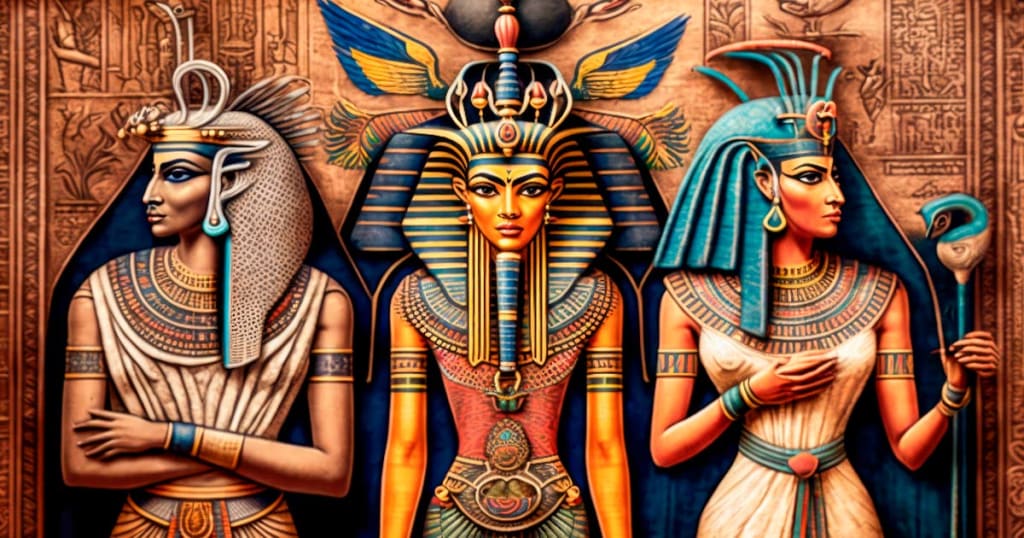Content warning
This story may contain sensitive material or discuss topics that some readers may find distressing. Reader discretion is advised. The views and opinions expressed in this story are those of the author and do not necessarily reflect the official policy or position of Vocal.
Ancient Egypt Explained
Ancient Egypt: Unraveling the Enigmatic Civilization

The allure of Ancient Egypt has captivated historians, archaeologists, and the public for centuries. From the enigmatic hieroglyphics to the Sphinx, from macabre mummies to the Great Pyramid, this ancient land has left an indelible mark on human history. Here, we embark on a journey to unravel the mysteries of Ancient Egypt, a civilization that has bequeathed us a wealth of texts, treasures, monuments, and myths, offering tantalizing clues to its exotic and wondrous culture.
The Timeless Nile: Lifeblood of Egypt
The story of Ancient Egypt is inseparable from the mighty Nile River, the life-sustaining force that flows from South to North. The seasonal flooding of the Nile has enriched the land, rendering it fertile for agriculture. However, this delicate balance between inundation and drought meant life and death for the inhabitants. The fertile land along the riverbanks first beckoned nomadic people to establish permanent settlements, leading to the growth of trade, commerce, class structures, and artistic flourishing.
The Unification of Egypt
Around 3600 BCE, as climate changes forced more people to migrate to the Nile's banks, the region faced a challenge in sustaining its population. Competition for resources gave rise to three main kingdoms, which vied for food, trade goods, precious stones, and gold. Ultimately, King Narmer emerged as the most powerful ruler, unifying the three kingdoms in 2950 BCE and founding the first nation-state in history. Under King Narmer's reign, Egypt gained its national identity and established a system of government and royal iconography.
Pharaohs: Earthly and Divine
Pharaohs, the rulers of Ancient Egypt, held unparalleled power in society. They were considered the earthly embodiments of Horus, the link between humans and gods. Their role involved not only appeasing the deities but also ensuring the well-being of their subjects. Drought, disease, famine, or war were seen as divine punishments, and the pharaohs bore the responsibility of maintaining the gods' favor.
The Rise of the New Kingdom
The New Kingdom (1570-1070 BC) marked a period of significant expansion and influence for Egypt. Pharaohs of this era extended their empire, constructed grand temples and monuments, and engaged in diplomacy with neighboring nations. Thutmose III, a prominent New Kingdom pharaoh, achieved military dominance, while Akhenaten, another ruler of this period, introduced monotheism, attempting to shift religious practices.
The Mysterious Sphinx and the Great Pyramid
Two iconic landmarks, the Great Sphinx and the Great Pyramid, epitomize Egypt's grandeur. The Great Pyramid, also known as the Pyramid of Khufu, is the oldest of the Giza pyramids, dating back to around 2560 BCE. It remains a marvel of ancient engineering and construction, serving as a testament to the skills of Egypt's pyramid builders. The Great Sphinx, often attributed to pharaoh Khafra, is equally awe-inspiring. Although its origins are debated, the Sphinx stands as a symbol of Egypt worldwide.
King Tut and the Afterlife
King Tutankhamun, or King Tut, gained global fame when his treasure-laden tomb was discovered in 1922. His burial practices shed light on Ancient Egypt's unique approach to the afterlife. The Egyptians believed in the importance of preparing for the hereafter. They developed embalming and mummification techniques, ensuring the preservation of the deceased's body. Funeral rituals, the burial of essential items, and the inclusion of family and servants in tombs emphasized the culture's deep-rooted belief in the afterlife.
The Enigmatic Cleopatra
Cleopatra, a prominent figure in the late period of Ancient Egypt, captivated Roman leaders and left a profound impact on history. Her love affairs with Julius Caesar and Mark Antony are the stuff of legend. Her relationship with these Roman figures led to political entanglements and her role as the ruler of Egypt. Cleopatra's story mirrors the complex and intertwined history of Egypt and the Mediterranean world.
The Legacy of Ancient Egypt
Ancient Egypt's cultural legacy endures, celebrated for its engineering marvels, artistic achievements, and contributions to human civilization. The enigmatic hieroglyphics, cursed tombs, and captivating myths continue to inspire awe and wonder. This civilization, born from the arid sands of Northern Africa, left an indelible mark on history and remains the subject of ongoing study and fascination.
To delve deeper into the captivating history of Ancient Egypt, consider exploring our comprehensive guide, "Ancient Egypt: A Captivating Guide to Egyptian History, Ancient Pyramids, Temples, Egyptian Mythology, and Pharaohs like Tutankhamun and Cleopatra." It is available in various formats, including e-books, paperbacks, and audiobooks.
If you found this article engaging, please show your support by hitting the like button and comment for more informative content.
About the Creator
React Wizards
Welcome to my realm – where every blog is a story waiting to be told. Subscribe and become part of a community that celebrates the beauty of words and the boundless worlds they create.
Happy reading! 📚✨






Comments
There are no comments for this story
Be the first to respond and start the conversation.